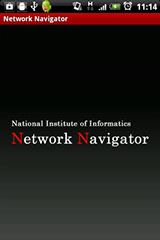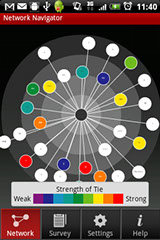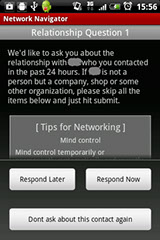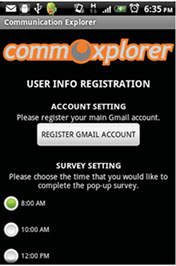
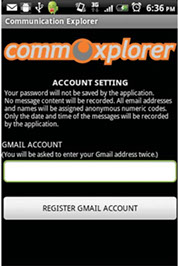
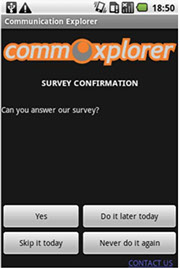
Software
E-Rhythms App
This app has two parts: an on-line researcher portal and an Android App. The on-line portal allows researchers to customize their own version of the Android App. Researchers can develop their own on-screen survey questions and setup the application so that it can be used as to stimulate questions during in-person interviews. The application will also collect anonymized voice and text data..
More information: How to use the E-Rhythms App – video tutorials for researchers
Collaborators and Funding
Development of this software is directed by Dr. Jeffrey Boase. Student collaborators working on the development are Junji Zhi, Yingduo Tang, Jack Jamieson and Hirokazu Oda.
Development is supported through a grant from the Social Sciences and Humanities Research Council of Canada.
E-Rhythms Data Sonifier
What does electronically mediated social interaction sound like? Is it a simple, familiar rhythm of everyday interaction with friends, workmates, and family? Or is it a complex harmony of interactions occurring through multiple communication channels, orchestrated by a masterful conductor? The E-Rhythms Sonification Software helps researchers address these questions by turning the log data collected by the E-Rhythms App into sound. It also allows researchers to see this data at the same time they are listening to it using a new data visualization technique.
As well as sonifying data collected by the E-Rhythms App, the sonifier will work with any kind of time-based log data saved as a .csv. Documentation about how to import data is included in the download file.
More information: Tutorial videos
Requires Mac OS 10.7.3 or newer
IMPORTANT: if you receive a message saying that the file is is "damaged" you will need to enable the following option: System Preferences > Security and Privacy > Allow apps downloaded from: > Mac App Store and identified developers.
Requires a 64 bit version of Windows XP (with latest service pack), Vista, 7, or 8.
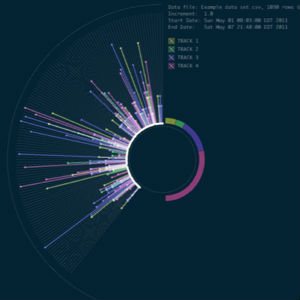
Collaborators and Funding
Development of this software is directed by Dr. Jeffrey Boase. Collaborators working on the development are
Jack Jamieson and Hirokazu Oda.
Development of the E-Rhythms Data Analysis Software is supported through a grant from the Social Sciences and Humanities Research Council of Canada.
Network Navigator App
The “Network Navigator” is an application that runs on Android smartphones and allows users to visualize their voice, text, and email communication patterns with others over time. This visualization technique provides insight that can be used to improve relationships and reconnect with friends, family, and colleagues.
This application is also designed to collect anonymized communication data for the sole purpose of conducting academic research. No identifying information is collected and all data is anonymized using an irreversible encryption method. To maintain users privacy the content of text messages and email messages are never recorded, copied, or uploaded.
Collaborators and Funding
Development of this software was co-directed by Dr. Tetsuro Kobayashi and Dr. Jeffrey Boase.
Development was supported by funding from the National Institute of Informatics, Japan.
The app is available for download on Google Play: Network Navigator
Communication Explorer App
The Communication Explorer App is a research tool that anonymously collects information from users of the Android OS. The app allows the researchers to paint a more complex picture of communication patterns across various platforms, including: email, texting, social networking, and phone use. Communication Explorer works by recording users’ answers to one initial survey and a daily pop-up survey thereafter. Then the app records times, dates, and types of communication, as well as whom they are contacting using anonymous identifiers. All the data is completely encrypted; there is no way to identify a specific user or those they have communicated with based on the data that is uploaded to the server.
Collaborators and Funding
Development of this software was co-directed by Dr. Jeffrey Boase and Dr. Tetsuro Kobayashi.
Development was supported through funding from the National Institute of Informatics, Japan.
